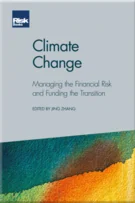The future and its challenges
The future and its challenges
Preface
Introduction: human-machine entanglement
Machine learning: origins
Useful tools
Decision trees
Introduction to neural networks
Back-propagation
Regularisation
Optimisation
Building neural networks
Early applications of machine learning
Interpreting neural network decisions
Predicting corporate bond returns
Deep learning networks
Applications of deep learning networks
Machine intelligence
Consciousness
The future and its challenges
Artificial intelligence and the military
Final thoughts
Appendix
Epilogue
Acknowledgements
In this chapter, we examine applications of machine learning as they affect people and institutions. In addition, potential policy actions are suggested to control personal identity theft, deter commercial fraud and monitor suspected criminal activity. Equally important are governmental and business responses to increasing income inequality and climate change. Before considering the control of machines and risks to public safety, we consider the advances that have been made in machine learning and their challenges, along with artificial-intelligence-related (AI-related) economic activity. The chapter is concerned with how machine learning and AI will affect the economy, medicine, geopolitical conflicts and education, along with issues of personal freedom and safety. The chapter concludes by describing the emergence of personal robotics and how it might change the nature of human–machine and human-human interactions and attachments.
17.1 COMMON PROBLEMS
The creation and operation of the Internet has had little dependence on machine learning. However, the Internet hosts a large array of useful and malicious software driven by machine learning algorithms. A survey of US adults conducted
Copyright Infopro Digital Limited. All rights reserved.
As outlined in our terms and conditions, https://www.infopro-digital.com/terms-and-conditions/subscriptions/ (point 2.4), printing is limited to a single copy.
If you would like to purchase additional rights please email info@risk.net
Copyright Infopro Digital Limited. All rights reserved.
You may share this content using our article tools. As outlined in our terms and conditions, https://www.infopro-digital.com/terms-and-conditions/subscriptions/ (clause 2.4), an Authorised User may only make one copy of the materials for their own personal use. You must also comply with the restrictions in clause 2.5.
If you would like to purchase additional rights please email info@risk.net









